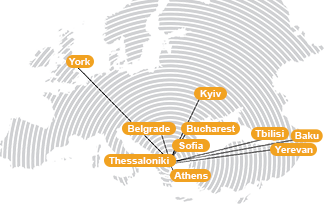Research has shown that bilingual adults outperform monolinguals in tasks of cognitive control, and have attributed this bilingual proficiency to the lifelong training bilinguals undergo to manage two linguistic systems. However, most of the studies conducted so far had several methodological limitations, the most important of which being the lack of control for Socio-Economic Status (SES) of the participants, a factor repeatedly shown to influence cognitive performance. Moreover, while executive attention has been relatively well studied, the two other functions of attention, alertness and visuospatial orienting, have been largely ignored in studies of bilingualism. Hence, we studied the influence of bilingualism in the three main attentional networks, taking SES into account. No bilingual advantage was found in the alerting and orienting networks. Additionally, contrary to existing studies, bilinguals tented to perform worse than monolinguals in the executive attentional control task. This suggests that controlling for SES may have attenuated the bilingual advantage on attention.






